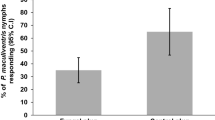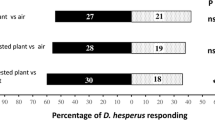Abstract
The objective of this study was to determine whether the presence of a deleterious chemical in a preferred host plant could alter the feeding preference of a polyphagous insect. The preference of the Asian armyworm, Spodoptera litura (F.) (Lepidoptera: Noctuidae) for castor, Ricinus communis (L.)(family: Euphorbiaceae) relative to cabbage, Brassica oleracea (L.) (family: Brassicaceae) was quantified by two separate two-way choice tests (without treatment and with treatment of the test chemicals used in the present study) with naive third instar larvae each time. This was followed, by continuous feeding (48 h) on the preferred host treated with the test chemicals and using naive third instar larvae for conditioning. Each treatment consisted of one of nine compounds, including seven naturally occurring allelochemicals (viz. (−)-β-pinene, (−)-β-pinene, β-myrcene, {D}-limonene, cineole, rutin, and ajwain oil) and two synthetic insecticides (viz. alphamethrin and malathion). Following this, a two-way choice test was repeated with the same batch of larvae without any test chemical. Larvae continued to maintain preference for castor despite exposure to the deleterious chemicals. Among the test chemicals, {D}-limonene and alphamethrin caused significant reduction in growth. Preference for castor was not overcome by exposure to novel deleterious chemicals, suggesting that aversion, though experienced is not learned.
Similar content being viewed by others
References
Behmer, S. T., and Elias, D. D. (1999). Phytosterol structure as a basis of food aversion learning in the grass hopper Schistocerca americana (Orthoptera: Acrididae). Physiol. Entomol. 24: 18–27.
Behmer, S. T., Elias, D. D., and Bernays, E. A. (1999). Post -ingestive feedbacks and associative learning regulate the intake of unsuitable sterols in a generalist grasshopper. J. Exp. Biol. 202: 739–748.
Berenbaum, M. R. (1991). Comparative allelochemical processing in the Papillionidae (Lepidoptera). Arch. Insect. Biochem. Physiol. 17: 213–221.
Bernays, E. A., and Lee, J. C. (1988). Food aversion learning in the phytophagous grasshopper Schistocerca americana. Physiol. Entomol. 13: 131–137.
Bernays, E. A., and Weiss, M. R. (1996). Induced food preferences in caterpillars: The need to identify mechanisms. Entomol. Exp. Applic. 78: 1–8.
Dethier, V. G. (1980). Food -aversion learning in two polyphagous caterpillars, Diacrisia virginica and Estigmene congrua. Physiol. Entomol. 5: 321–325.
Dethier, V. G. (1988). Induction and aversion-learning in polyphagous arctiid larvae (Lepidoptera) in an ecological setting. Can. Entomol. 120: 125–131.
Dethier, V. G., and Yost, M. T. (1979). Oligophagy and absence of food-aversion learning in tobacco hornworm, Manduca sexta. Physiol. Entomol. 4: 125–130.
Gelperin, A. (1975). Rapid food-aversion learning by a terrestrial mollusk. Science 189: 567–570.
Gelperin, A., and Forsythe, D. (1975). Neuroethological studies of learning in mollusks. In Fentress, J. C. (ed.), Simpler Networks and Behavior, Sinauer, Sunderland, MA, pp. 239–250.
Ghumare, S. S., Mukherjee, S. N., and Sharma, R. N. (1989). Effect of rutin on the neonate sensitivity, dietary utilization and mid-gut carboxylesterase activity of Spodoptera litura (Fabricius) (Lepidoptera:Noctuidae). Proc. Indian Acad. Sci. (Anim. Sci.) 98: 399–404.
Lee, J. C., and Bernays, E. A. (1990). Food tastes and toxic effects: Associative learning by the polyphagous grasshopper Schistocerca americana (Drury) (Orthoptera:Acrididae). Anim. Behav. 39: 163–173.
Lindroth, R. L. (1991). Differential toxicity of plant allelochemicals in insects: Roles of enzymatic detoxification systems. In Bernays, E. A. (ed.), Insect-Plant Interactions, Vol. 3, CRC Press, Boca Raton, FL, pp. 1–33.
Moussa, M. A., Zaher, M. A., and Kotby, F. (1960). Abundance of cotton leafworm, Prodenia litura (F.) in relation to host plants. Host plants and their effect on biology (Lep. Agrotidae-Zenobiinae). Bull. Soc. Entomol., Egypte 44: 241–247.
Mukherjee, S. (2003). Influence of plant allelochemicals on growth rate, nutritional physiology and mid-gut esterase activity in fifth instar larvae of Spodoptera litura (F.) (Lepidoptera: Noctuidae). Invert. Reproduct. Dev. 43: 125–132.
Nagarkatti, S., and Prakash, S. (1974). Rearing Heliothis armigera (Hubn.) on an artificial diet. Commonwealth Inst. Biol. Contr., Tech. Bull. 17: 169–173.
Potter, D.A., and Held, D. (1999). Absence of food-aversion learning by a polyphagous scarab, Popilliajaponica, following intoxication by geranium, Pelargonium x hortorum. Entomol. Exp. Applic. 91: 83–88.
Ratcliffe, J. M., Fenton, M. B., and Galef, B. G., Jr. (2003). An exception to the rule: Common vampire bats do not learn taste aversions. Anim. Behav. 65: 385–389.
Steel, R. G. D., and Torrie, J. M. (1960). Principles and Procedures of Statistics, McGraw-Hill, New York, 481 pp.
Szentesi, A., and Jenny, T. (1990). The role of experience in host plants choice by phytophagous insects. In Bernays, E. A. (ed.), Insect/Plant Interaction, Vol. II, CRC Press, Boca Raton, FL, pp. 39–74.
Author information
Authors and Affiliations
Corresponding author
Rights and permissions
About this article
Cite this article
Ghumare, S.S., Mukherjee, S.N. Absence of Food Aversion Learning in the Polyphagous Noctuid, Spodoptera litura (F.) Following Intoxication by Deleterious Chemicals. J Insect Behav 18, 105–114 (2005). https://doi.org/10.1007/s10905-005-9350-z
Issue Date:
DOI: https://doi.org/10.1007/s10905-005-9350-z




